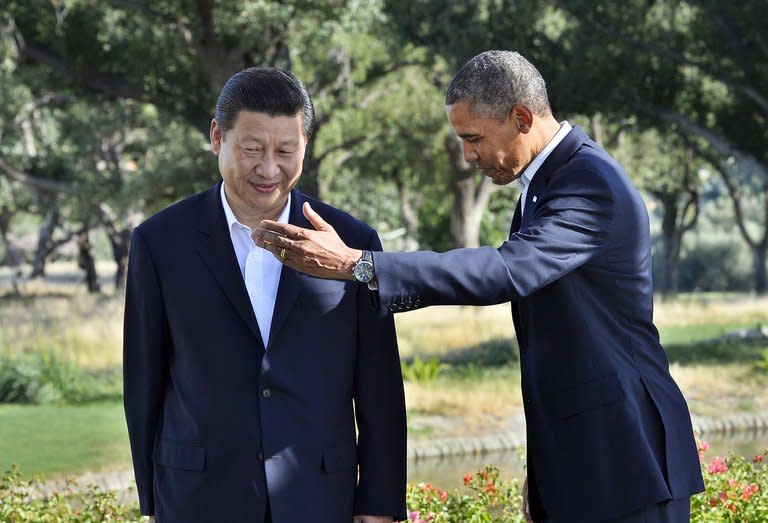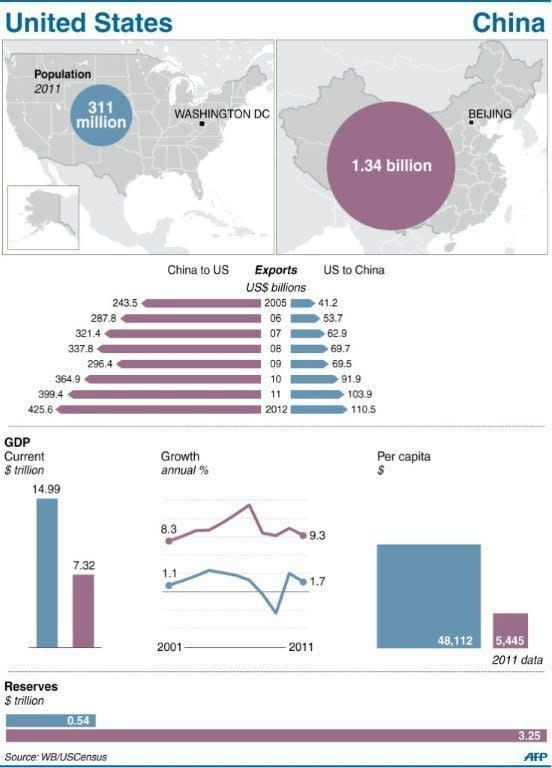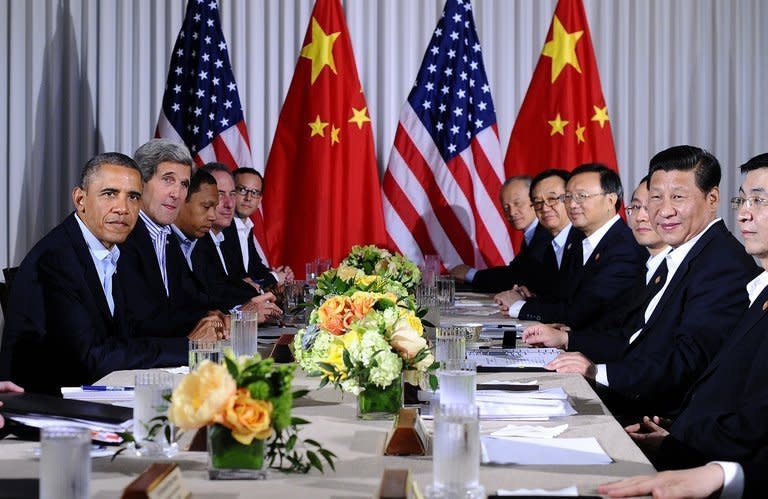Obama, Xi forge rapport in debut summit
Barack Obama and Xi Jinping ended their first US-China summit, forging a rapport and policy understandings, if not breakthroughs, on North Korea, climate and cyber issues. The presidents spent eight hours together over two days, in intimate groups with staff, over a dinner of lobster and steak, and strolling through the lush gardens of a California desert oasis, in a casual departure for Sino-US ties. It was the first US-China summit since Xi, 59, assumed full power in March and Obama, architect of a rebalancing of US diplomacy towards Asia viewed with suspicion in Beijing, embarked on his second term. Both sides wanted to loosen the formality of US-China talks -- and appeared to succeed: at one point Obama and Xi, finding common ground as politicians, sketched respective visions for where they hoped to take their nations. By the time Xi left on Saturday, US officials said, the two men had talked bluntly about a new flashpoint, cybersecurity, chided North Korea's nuclear grandstanding and agreed a new joint push on climate change. US National Security Advisor Tom Donilon said the talks were "uniquely informal," "constructive," "wide-ranging," and "positive" for a vital great power relationship which is often prickly and requires constant maintenance. Chinese state counsellor Yang Jiechi said the leaders did not "shy away from differences," including US arms sales to Taiwan and Beijing's territorial claims in the South China Sea. Obama and Xi agreed to work together for the denuclearization of the Korean peninsula, following nuclear and missile tests and wild warnings of atomic warfare from North Korea, Beijing's troublesome nominal ally. They achieved "quite a bit of alignment" on the issue, Donilon said, and praised recent steps by Beijing to quietly rebuke inexperienced North Korean leader Kim Jong-Un. Obama meanwhile made clear that a rash of suspected Chinese cyber attacks on US commercial property and military technology would be an "inhibitor" to relations. Donilon said that Xi "acknowledged" how important the issue was to Washington, and left California in no doubt where Obama stood. The leaders also offered directions to working group officials from both sides due to sit down to discuss cyber issues in July. On Friday, Obama called for common "rules of the road" on cybersecurity. "It's critical, as two of the largest economies and military powers of the world, that China and the United States arrive at a firm understanding." Xi said he wanted "good-faith cooperation" on the issue, but stood his ground, saying China was also "a victim of cyberattacks." In a more tangible outcome from the talks at the Sunnylands retreat once patronized by Frank Sinatra and Richard Nixon, the White House said Obama and Xi agreed a joint effort to combat climate change, specifically the production of "super greenhouse gases" or HFCs. The gases are used in air conditioners and refrigerators and China -- by far the largest producer of HFCs -- had until recently resisted efforts by the United States and other nations to scale back emissions of the gases. But it agreed in April to end HFC production by 2030 as part of a $385 million assistance package by wealthy countries under the Montreal Protocol, which was set up to fight the depletion of the ozone layer. Xi is expected to lead China during a decade in which it will overtake the United States as the world's largest economy. A long-running spat over what Washington sees as China's artificially supported currency has cooled, but trade spats still often sour the mood between the two nations, which are now economically interdependent. China's official Xinhua news agency said Xi asked Obama to loosen restrictions on US hi-tech exports to China and to offer "equal treatment" to Chinese businesses investing in the United States. Hovering over the summit was a vexing question for both sides -- whether China's rise means an inevitable clash with the United States, which Obama sees as a Pacific power. US officials confided after the talks that they were gratified that Xi swiftly agreed to a less formal summit than the dreary encounters, which largely stuck to talking points, Obama had with ex-president Hu Jintao. Xi invited Obama to pay a return informal visit to China. Donilon said the two sides would work together to set a date, and also to work out a schedule for an exchange of state visits. Mirroring his host's theme of a new approach, Xi said on Friday that "the vast Pacific Ocean has enough space for two large countries like the United States and China." Obama also gave Xi something not every world leader has: the huge wooden park bench on which they sat to chat. "President Obama's gift to President Xi was a custom-designed park bench. The bench is inscribed on the front with the dates of this visit, and, in Mandarin, the fact that the bench is made of California redwood," the White House said in a statement, Out on a stroll of the grounds of Sunnylands, where the leaders held their talks, Xi and Obama sat for a moment together on the bench, said Obama's deputy national security adviser Ben Rhodes.





